I walked into the doc's office, my arm a deep purple with a yellowish tinge. He greeted me with a tight-fisted pound and a "Yo bro! What did you do this time?" He was a young guy who played Division-I football, and he was sympathetic to athletes. He understood that we're not like "regular" people. I had been to see him a dozen times for a variety of self-inflicted ailments.
The doc explained to me that surgery would do me no good. I had a 30 percent rupture of my biceps, not a tear. This meant the muscle came apart in the middle and not from either attachment. "It's like trying to sew together a wet paper towel," he said. "In 10-to-12 weeks, you'll be fine," he reassured me. It looked like the summer was shot for competing.
Before I left, I asked about my back, which had been feeling increasingly unstable. He sent me downstairs to get a quick MRI—if there is such a thing—and an X-ray of my lumbar spine. I was expecting to hear that I had aggravated my already bulging disc, the remnants of a years-old football injury, but that I was mostly good. Hand me some ibuprofen and I'd be on my way.
The doctor came in with my file, mouth agape. "Dude, did you get hit by a car recently?" Turns out that the "pulled hamstring" that had been keeping me up at night was a nerve impingement, and that shaking in my left leg, well, that was a whole other problem. Apparently, I had been walking around with a broken back and then some: two fractured vertebrae, a bulging disc, a herniated disc—both degenerated to shit—and one extremely ruptured disc at L5-S1. Imagine you fisted a jelly donut against the pavement.
My doctor, the two nurses and the back specialist all stared at me with concern. They might as well have told me the sun was going to rise tomorrow. "What's our course of action? Because if I need surgery, get me in tomorrow. I need to get back to training," I told them. They said I didn't understand the magnitude of the problem. They told me I needed to accept the fact that I might never lift again.
Going Nowhere Fast
My eyes open slightly to reveal a blurry hospital room. It's dark and I'm alone. I edge my legs to the side of the bed and pull myself to a seated position with my legs hanging. I quickly realize blood has been running down my lower back and pooling on the hospital bed. I struggle to my feet but realize I'm going nowhere fast.
I need to piss, as I have every morning previous in my life, but I can barely walk. I sit up, supported by the back brace strapped onto me, and with the help of a nurse, slowly shuffle toward the bathroom. My bare ass is hanging out of my gown for the entire nursing staff to see. I can't care less. There I stood, once so strong, with one hand on a railing and shoulder against the wall, weak and incapable like a newborn fawn.
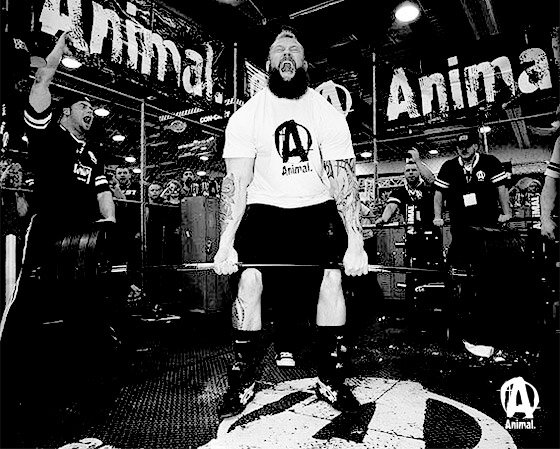
A full year of bullshit preceded the surgery; that gave me a permanent disdain for the medical community. First, I went to a doc who wanted to "experiment" with a few months of therapy. To my ears, this sounded like wasted time I could spend rehabbing from surgery. No thanks. Door number two was an epidural injection. In this procedure, a long needle is inserted into the lumbar spine, piercing the disc where the problem lies. With luck, the injection reduces disc space and in turn, relieves the pressure on the nerves adjacent to the spine...with luck.
So I headed in to get my first injection. It didn't work, so I had another. In both cases, my back and reciprocal injuries were significantly worse a week after injection.
I sat in the examination room for more than an hour, mad as hell, becoming filled with greater rage the longer I had to sit there. The doctor finally entered without a smile. I lashed out. "You fucked me doc," I yelled. The nurse came in due to the noise, and I continued yelling: "It's OK for you to rip me apart with no qualification or condolence, but it's the end of the world when some big meathead raises his voice?" I threw my file to the floor and left as he muttered something about trying therapy again. Five and a half months had been wasted.
Under The Knife
I decided that I would no longer comply with the doctors. I knew what I wanted as an athlete. I just needed to find a surgeon who would have the balls to work with me—wherever he might be. I visited five more with no success. As soon as they lectured me about heavy lifting, brought up therapy, or mentioned those damn injections, I would stand up, leave the room, pay my co-pay and quickly exit the building.
I talked to one of my boys who owned a few gyms in the area and who played quarterback in college. He connected me with a neurosurgeon he had gone to, who had been the team physician for a number of pro sports teams. I thought: This is the dude I need.
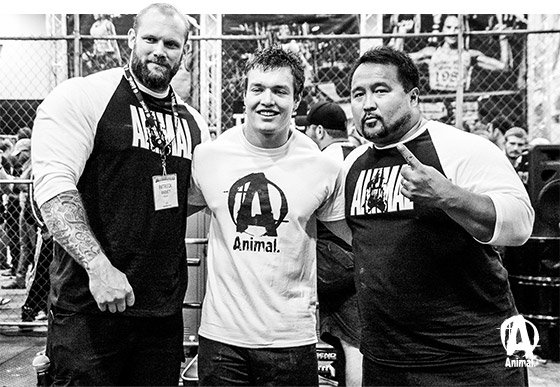
The surgeon had zero bedside manners, and I mean none. But he knew his shit and was one of the most knowledgeable resources I had come across thus far. We spoke for about an hour with a nurse practitioner present. He broached the subject of removing the discs and fusing my vertebrae, which would almost ensure I would never lift again. Not happening. Eventually, we found a happy medium, and after a year of frustration, I was scheduled for surgery the following Monday.
I wrote two letters the night before I went into the hospital to the people I care about most. The letters were only to be opened in the event of the worst. Yeah, I was nervous, but more than ready. After hours under the knife, and after having a surgeon cut through every layer of flesh in my lower back, I was stitched up.
It was done. I had no idea what was coming. I just knew I would find a way.
"Stop telling me what you used to do"
I suppose you're never too old for your mother to take care of you. "I'll always be your mother no matter how big you get," she always said to me. Now I knew what she meant. In the aftermath of my surgery, the woman who brought me into this world wheeled me to the car, helped me in, and buckled my seatbelt. Those are the only things I can remember with any clarity.
For two weeks, I sat and stared. I don't remember sleeping. I gazed comatose at movies, documentaries, and full seasons of shows from morning until late into the night. On day three, I walked halfway down the driveway, got short of breath, and struggled back. I saw the sun rise and set. I sat—a sallow shell of my former self—consuming Vicodin and Percocet like Skittles. I didn't take any calls or get on the Internet. I wrote, a lot, mostly inane babble.
My therapist was an older fella, deaf in one ear, and a no-nonsense professional. Most of my therapy was going to be aquatic, and I informed him that I swim like a fish. He proceeded to tell me with a smirk that if I went near the pool before I was cleared, he would club me over the head and I would sink like a rock. OK.
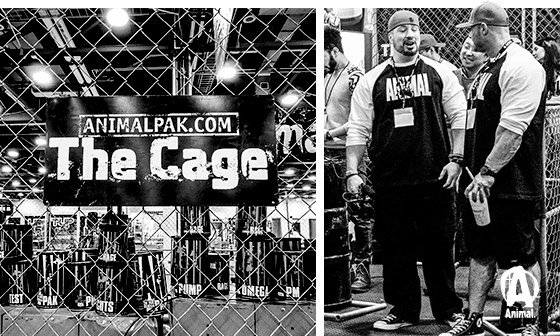
In the meantime, I performed a variety of abdominal control exercises, utilizing a stopwatch, broomstick, and tennis ball. I felt like I was in the damn circus. We ended with a few body contorting poses, some electric stim, and ice. I told him, "I'm an aggressive dude. I'd like to attack this head on and give it everything I've got. I don't know how to take it easy."
He smiled and replied, "You'll learn son. Come see me five times a week." Five times was a lot. And I hated being called son.
After two weeks, I was finally cleared for "some" activity. I was allowed to drive now, and every session took me a step closer to the gym, and to the light. Therapy was cut to three days per week, and I moved into the pool in addition to my normal program. I told my therapist this is how I used to do the majority of my cardio, sprinting in chest-high water, when I was competing as a strongman. He shook his head and laughed, "Stop telling me about what you used to do and focus on what you are doing now." Well said.
Finally, I got the green light to go back to the gym. After an hour of therapy, I would head immediately to the gym for my own "extended" therapy. This is how it went for three months.



One final "no"
I returned to my surgeon for a follow-up a few months in. We discussed my progress and plans for my future as an athlete. I had very little shaking left in my left leg and some residual pain in my right hamstring, but nothing like it was. The doc expressed that the minor pain may be from some inflammation or scar tissue, but assured me I was far beyond where he had anticipated I'd be in such a short time.
I was encouraged by the news and told him about my plan for when I was clear: to build the strength of my core and back before I returned to competing. He seemed confused and explained that while my plan was all well and good, I should never carry any weight on my back ever again, and deadlifts were out of the question. The deadlift movement at lockout is exactly the motion I needed to avoid, he said.
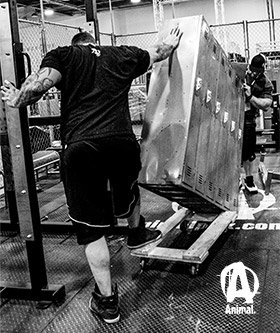
This seemed like the final insult. I had sacrificed so much—family, health, life, love. And for what? Who was I if not an athlete? That thought kept running through my head. For so long, being an athlete wasn't just something I did, it was who I was.
Life, I discovered in that moment, has a way of kicking you in the face when you're down—so hard, sometimes that your teeth litter the street like confetti. But you find out exactly how you are wired when faced with such adversity.
For months I found myself in a pit, deep and dark with no light apparent to the eye. I dug the pit myself but had help along the way. No matter how ominous the hell you've come from or the one you head into, there comes a time when you have to grab hold of your nuts and begin climbing. I did so blindly, but with a sense of fated direction.
Dedicated from the onset, my unwavering desire burned bright. I had changed. The world around me may not have, but I did. I found myself far from beyond this darkness. I could see light, small and fragile, and felt like I was trudging toward it with a thousand pounds on my back.
I picked myself up, brushed off the dirt, cleaned up the blood and kicked the misery to the curb. One more "no" wasn't going to be enough smother the desire that continued to burn in me. I wasn't done yet.
I silently made a deal with myself. For an entire year after the doctor considered me "rehabilitated," I would implement my own form of rehab. No top loading exercises for six months, keep my body weight down, and nothing less than 20 reps per each set. This would force me to utilize moderate weight in a much more controlled way without stressing my back.
When that year was up, I would stop listening and finally start competing again.
"It's On You Now"
One more doc...one more time. Some residual pain still lingered, but I was told it was just scar tissue. The doc was clean cut and didn't vomit his stats about who he had operated on in the NFL. I had in hand four MRIs, two X-rays, two surgery reports, my injection history, and my physical therapy report. You'd think we were launching a damn space shuttle.
I told the doc to get his tape recorder ready, because, once I started talking, there would be no stopping me. I regurgitated the timeline, long ago committed to memory. At the end of my rant, he paused and looked at me. "Patrick, you're a high-caliber athlete. I'm not here to tell you to take it easy or what to do or not do. That's up to you."
As I sat there and stared, he continued: "What I'm here to do is give you all the tools to get back into the game. If you trust me to do that, let's move forward and get you back to what you love doing." This was the Gettysburg Address of pep talks. For the first time, a doc was working with me and not treating me as if I was privileged to be working with him.
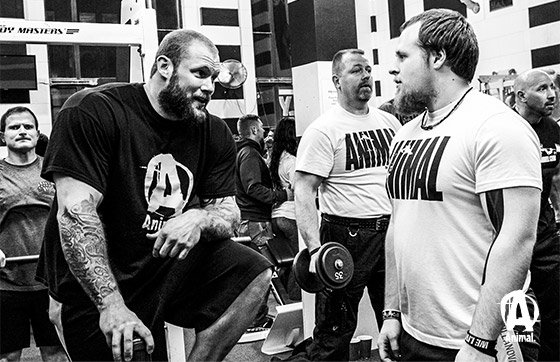
This injection was to be the last, and it would be shot deep and straight into my spine, like a rocket. It was a little more precise than the previous ones, and I was knocked out for it. The doc hoped that this shot would break up the residual scar tissue from both the damage I had caused and the ensuing surgery.
In the post-op room, he told me, "It's on you now. In a week or two, hit it as hard as you'd like. If it doesn't hurt, do it. Hell, if it does hurt, do it anyway. By now, you know the difference between pain and injury. Get after it. Good luck."
Success! The years it took tearing myself down, building this injury, and it was done, just like that. Eleven years since that hit on the football field, and I might just be whole again.
The Lift of a Lifetime
I'm in Columbus, Ohio. It's 2012 and I'm standing in the middle of The Cage preparing to dead. Despite all the noise, I can feel it. It's a pulse. I stop for a moment and breathe it all in. I felt like it took me a lifetime to get here, a place I never thought I'd be able to set foot in again. I was told that I couldn't, wouldn't, and shouldn't every step of the way. There is no way in hell that that day, that moment in time, meant more to anyone in that place than it did to me.
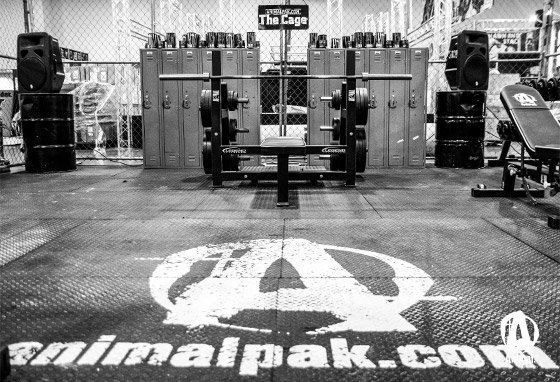
I step up to the weight and grip the bar. With quiet intent, I grind my chalk-laden hands against it. I chew up the thickened calluses, making them rough, getting that familiar bite. In my head, through the impenetrable din of the crowd and blaring metal, I tell myself, "I'm gonna tear this muthafucka off the floor."
Once I'm there, in my own madness, in my own world, everything else just fades away. Just like it always has. I pull the bar tight to my shins. Chest up, big air...
The sun hasn't set on me yet. This is not the end. This is just the beginning.

Recommended For You
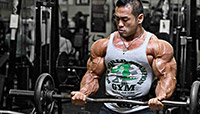
8 Ways To Maximize Your Muscle Pump
Looking for ways to maximize your muscle pump and garner the best results from your workouts? Here are 8 tips to get you pumped!
8 Unusual Arm Exercises You Have To Try!
Building a set of killer arms takes more than standard barbell curls and triceps press-downs. Try these 8 unique arms exercises to blow your sleeves apart!
